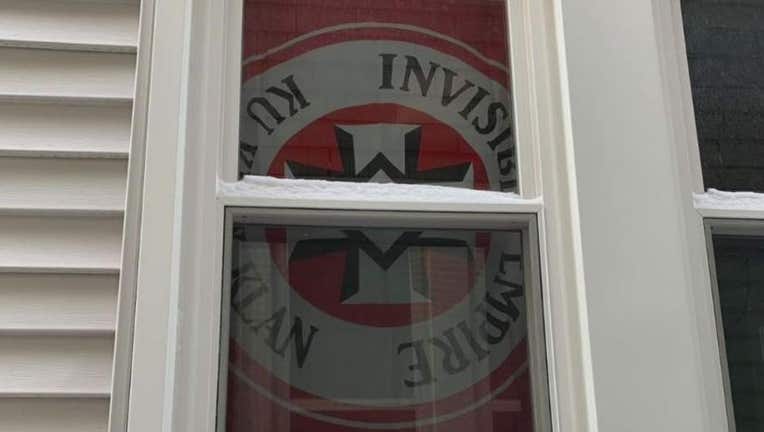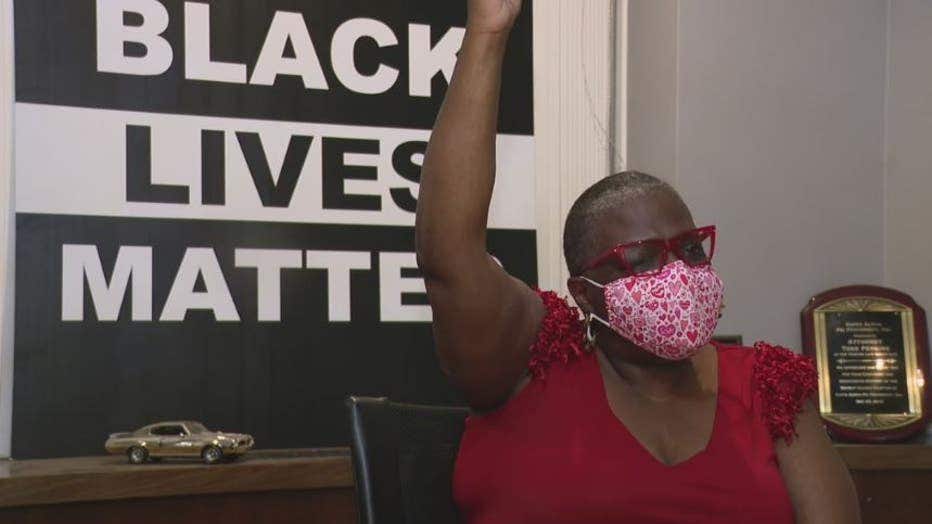Federal lawsuit filed on behalf of Black woman whose ex-neighbor hung KKK flag in Grosse Pointe Park

Photo of the KKK flag that was displayed in Grosse Pointe Park in 2021.
FOX 2 (WJBK) - A Black woman and her daughter have filed a federal case against a former neighbor in Grosse Pointe Park for ethnic intimidation including a KKK flag and racial threats.
Je Donna Dinges' lawsuit is being handled y the Civil Rights Litigation Initiative at the University of Michigan Law School, it was announced Tuesday.
The case is against Ryan Wilde, who hung a Ku Klux Klan flag in the window, and allegedly fired his gun outside and once left a full gas can in the family's recycling bin. The incidents were originally reported in February of 2021.
"We felt terrorized in our own house and feared for our lives," said Je Donna Dinges, a small business owner in a release. "I thought the days of the KKK forcing Black families out of white neighborhoods and threatening to burn down Black homes was a thing of the past."
Wayne County Prosecutor Kym Worthy said the display of the KKK flag was not ethnic intimidation and did not file criminal charges in March of 2021.
"There is absolutely no question that what happened to Ms. Dinges was despicable, traumatizing, and completely unacceptable. But, very unfortunately in my view, not a crime," said Worthy in a statement at the time.
While the neighbor eventually took the flag down, concerns over the flag's flying remained. In order for someone to commit ethnic intimidation, the action requires there be "physical contact, damage, destruction, defacement of property, or threats to do so."
The lawsuit was filed Tuesday morning in the United States District Court for the Eastern District of Michigan. It asserts that Wilde unlawfully interfered with Je Donna and India Dinges’ property rights in violation of a Reconstruction-era law intended to, among other things, protect Black people from the KKK.
The Dingeses also allege that Wilde violated Michigan’s Ethnic Intimidation Act.
In the lawsuit, Dinges said Wilde started to terrorize her and her daughter shortly after moving in next door. In 2021, Wilde hung a KKK flag in his window facing the Dinges house. The flag was only five feet from the Dingeses’ home and was not visible from the street.
In the lawsuit it details numerous incidents including:
● Placing a full gas can in their recycling bin.
● Firing a gun multiple times in the middle of the night from his back porch.
● Blocking Je Donna from entering the shared walkway between his house and the
Dingeses’ home and staring at Je Donna in an intimidating way.
● Throwing garbage in the street in front of the Dingeses’ house.

Je Donna Dinges acts out how her neighbor opened fire pointing his gun at the sky in a previous incident.
Wilde has an established history of being racist and violent, as alleged in the complaint. Wilde used the N-word when speaking to the police about the Dingeses, he called a
Black driver the N-word in a road rage incident, and he told someone over a dating website that he hated the Black woman next door.
The Grosse Pointe Park police warned officers about the possibility that Wilde, who has nine registered guns, would be violent.
After the KKK flag incident, the Grosse Pointe Park community rallied behind Je Donna and India Dinges, organizing a "Hate Has No Home Here" march that drew about 800
people. Despite this show of community support, Wilde continued to harass the Dingeses and the family felt that, for their own safety, they had to move.
"This case harkens back to a shameful time in our history when the KKK used threats and violence to enforce segregated neighborhoods," said CRLI Student Attorney Sarah
Hall. "We, like the hundreds of Grosse Pointe residents who marched in support of our clients, will work to ensure that those who make racial threats are held accountable."
In addition to Hall, Je Donna and India Dinges are represented by CRLI Student Attorney Anna Silk, and Professor Michael J. Steinberg, Director of CRLI. The case was referred to CRLI by the Fair Housing Center of Metropolitan Detroit.

